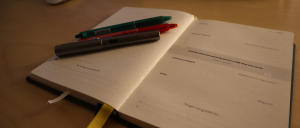
You know by now I’m a productivity nerd and todays episode is about productivity. Even in a bit more detail if Todo-lists really work. A spoiler, yes, they do work. But let’s get into it.
Todo lists has been around for a very long time. You can find notes from Benjamin Franklin and how he planned his work days. He used todo lists to handle his work. And through out modern history the lists has been used. One of the most fascinating places where I have seen it done is in Churchills war rooms in London, now a museum. There is a book that one of the staff members used and they recorded the tasks they needed to do on the D-day. I the show notes you’ll find a link to Cal Newports blog where he has some images of this. Truly fascinating.
As a side note, being a productivity nerd, you can see that the todos are full sentences. That helped the operator to clearly remember and know exactly what you should do. Do the thinking before and put clearly defined actions that you, even with a totally fried brain, know what they mean and what exactly you need to do. Ever felt the frustration finding “Steve” on your list having no memory which Steve you where referring to and what you where supposed to do with it!
Any way, back to the todo-lists and if they do work. There is constantly new research being done in this area and it is super interesting to follow. Last year Shamarukh Chowdhury at Carleton University (Canada) worked on research related to procrastination. They looked at todo-lists impact on the are of self-distraction also known as procrastination. During this research they of course did a lot of measurements – one of them was the level of conscientiousness. This is also one of the “factors” in the famous five factor model used to classify personalities.
One thing they found was that the use of todo-lists has a positive effect on procrastination. You are less prone to procrastinate. But the more detailed and formal your lists are, and the more you actually look at the lists and use them, the less you procrastinate. People with high level of conscientiousness seemed to also be using lists more.
An other thing they found was that the conscientiousness distribution between men and women in the survey where roughly the same. But even so women had a tendency to use lists more.
You will find a link to more information about this in the show notes.
This is a pretty nice proof that the lists actually do work. The more you use your lists and the better more thought through things you put into the list, the bigger is the chance that you will procrastinate less. This is one of the cornerstones in the Getting Things Done methodology. Think through your things, know what they mean and exactly what you need to do and where, then write out a clear next action. Using verbs. Then by using your lists often you check all the boxes to beat procrastination.
There is of course a lot more to say about procrastination. But I thought this was an interesting study.


